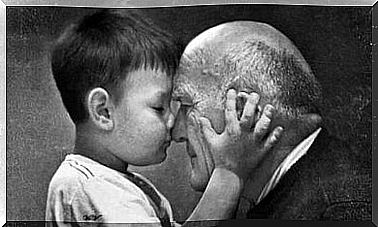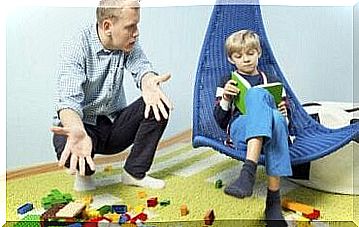How To Explain Alzheimer’s Disease To Children – Being Parents

Alzheimer’s disease is a neurodegenerative disease which, according to the Medical Research Foundation (FRM), currently affects 900,000 people in France. It is therefore common for children to know a parent or loved one who suffers from this form of dementia.
The question therefore arises as to how to explain Alzheimer’s disease to the youngest members of the family. Here are some ideas.
First, let’s start by pointing out that in order to explain Alzheimer’s disease to children in a simple and understandable way, you need to be sufficiently informed.
It is therefore advisable to read a lot on the subject beforehand. If necessary, you can contact an association specializing in Alzheimer’s disease in order to dispel all possible doubts about this terrible disease and its evolution.
How to explain Alzheimer’s disease to children?
Explaining Alzheimer’s disease to children is no easy task. That’s why we’ve compiled a list of tips that can help you. So take note of the following points!

1. Find the right time to broach the subject
When talking to children about Alzheimer’s disease, it’s important to find the right time to do so. This conversation should take place in a calm, relaxed atmosphere without distractions.
It is also essential to have time to present the situation correctly. In addition, calmly resolve any doubts and worries that children may have about the disease.
2. Explain Alzheimer’s disease clearly and concisely
During the discussion you should try to be concise and to the point. Also use simple and clear language appropriate for the child’s age.
It’s important for children to understand that Alzheimer’s disease isn’t just about memory loss. They should realize that this is a disease that affects the functioning of the brain and which, over time, can also affect the proper functioning of the body.
They must therefore be prepared to observe many changes in the person with Alzheimer’s. This can be especially difficult when it comes to a grandparent or another family member with whom they have a close emotional relationship.
3. Show support and understanding for children’s reactions
After the explanation, you can expect reactions from the children. According to the Alzheimer’s Association, children can exhibit some of the following feelings and behaviors:
- Sadness about how the person is likely to change.
- Curiosity about the disease.
- A fear that they or other relatives may also contract the disease.
- Frustration with this new situation.
- Worry about the different ways in which a person with Alzheimer’s disease might behave.
- Uncertainty about how to deal with someone with Alzheimer’s disease.
Faced with these reactions, we must be comforting and support the children. Try to make them understand that these emotions are quite normal and that they will gradually learn to deal with them.
4. Use books for children or adolescents on Alzheimer’s disease
Today, there is a wide variety of specialist books on the market that aim to help children understand Alzheimer’s disease. Here are some particularly notable titles:
- Alzheimer’s: what’s wrong with grandpa? This comic strip written by neurologist Mercè Boada tells the story of a child who discovers and begins to understand the illness from which his grandfather suffers during the summer holidays spent with him.
- The fox who lost his memory. It is a story told in the form of a fable in which the characteristics of Alzheimer’s disease are described through the experience of a fox.
- Alzheimer’s fairy. In this story, the fairy queen of a fantasy land begins to behave strangely because she suffers from Alzheimer’s disease.

The importance of explaining Alzheimer’s disease to children
It is essential to explain this disease to children. In particular when they will be in contact, permanently or occasionally, with a person suffering from the disease.
Otherwise, children may be frightened or confused by the behavior of the person with dementia. And this, without understanding what happens to her and why she behaves in this way.
To sum up, if you have to face such a situation, don’t forget to follow the tips that we have described for you. You now have some ideas to explain Alzheimer’s disease to children in the best way!









